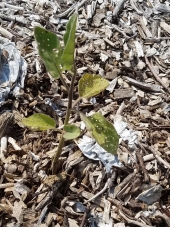Hey T.
Sounds rough, but not a unique situation, I'd imagine. I would strongly suggest that you peruse Bryant RedHawk's thread in search of super soil. I have posted it below.
https://permies.com/t/67969/quest-super-soil
I would suggest picking up christmas trees after christmas when everyone throws them away, though I was always concerned with importing unintended contaminants.
I would also suggest lots and lots of woodchips. You don't say where you're located, but many urban arborists have more woodchips than they can handle. If you can take a truckload, you might find a company that will drive out to you. In the past, they could be expected to both do that and give the chips away for free, but regional pressures vary.
I would suggest you dig those wood chips in. If you have paths, dig them down and fill them with wood chips. Use them everywhere. And start making and using the compost extracts that RedHawk describes in the thread posted above. After the first application of extract to the wood chips, I would suggest innoculating with fungal spore.
Importing non-clay clean fill is also an option, but you have to be careful of contaminants, and you didn't mention how large the land you're stewarding is, scale is a factor. But if you go the extract and fungus on wood chips route, you will attract more soil life.
How are the worms, by the way? Do you have any?
My last suggestion concerns cover cropping. It might take some looking to get strains that tolerate really rich soil well, but I would suggest cover cropping with plants that utilize or sequester the excess nutrients in your soil. Daikon radishes just for their sometimes 2' of root, just to compost in place and help drainage, maybe asparagus because it likes alkaline soils, things like squashes and melons for high phosphorous, corn for nitrogen, and peanuts for potassium. Alfalfa would also be a good choice, if it would work, as I believe they are both deeply taprooted and hosts for nitrogen-fixing bacteria. Not that you need more nitrogen now, but it would ensure those bacteria exist in your soil, and will take up the job of providing nitrogen as soon as the levels aren't so high. You are, after all, trying to achieve balance, not swing to the other end of the spectrum. Also, and I hope I am corrected if I am wrong, but I believe I remember reading that alfalfa prefers alkaline soils.
Now I might be wrong, if it is indeed so damaged by the high nutrient levels that nothing can get a toehold. In that case, I firmly believe that you need to make tiny planting pits in the ground and fill them with a mix of compost, and mineral and clay soils, and plant into those. Use a modified mounded three sisters technique. They will be your islands of change.
Oh. I guess I have another thought. You might want to think about biochar. Not in mass quantities, such as you'd need to affect drainage in heavy clay soil, but at least in quantity enough to broadcast in a crushed granular form, maybe incorporated into compost it has already been innoculating in. I am pretty sure it would greatly increase the speed of the soil remediation.
But please tell us a bit more about yourself and your land. It's more or less key to suggesting the right permacultural tool from the toolbox.
-CK
A human being should be able to change a diaper, plan an invasion, butcher a hog, conn a ship, design a building, write a sonnet, balance accounts, build a wall, set a bone, comfort the dying, take orders, give orders, cooperate, act alone, solve equations, analyze a new problem, pitch manure, program a computer, cook a tasty meal, fight efficiently, die gallantly. Specialization is for insects.
-Robert A. Heinlein






 2
2













 1
1




![Filename: soil-test-results.png
Description: Soil test results [Thumbnail for soil-test-results.png]](/t/73120/a/56552/soil-test-results.png)









 2
2






